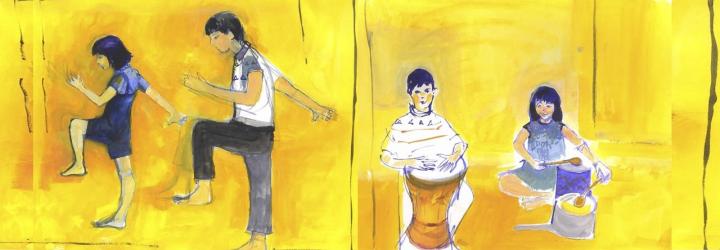It's My Turn: an interactive play on turn-taking
An interactive theatre performance uses music and mimicry to teach children how to take turns

What was the problem?
Successful turn-taking requires people to listen to their partner, predict when their partner will finish, prepare their own response, and come in at the right time.
Research suggests that people experience difficulties in turn-taking because of problems predicting when the other person will finish (Boiteau, Malone, Peters, & Almor, 2014). However, studies have shown mimicry (copying what another person is doing) can aid comprehension (Adank, Hagoort, & Bekkering, 2010).
Due to the similarities in their functions and organisation, language and music are often assumed to be processed similarly. However, little research has been carried out to compare whether people use the same skills to interact through language (i.e., in conversation) and through music (i.e., ensemble performance).
What did we do?
Research by Professor Martin Pickering, Dr Nina Fisher and Dr Lauren Hadley explores the mental processing of language and music, and how people interact successfully in language and music. It aims to understand the mechanisms of turn-taking, comparing and contrasting interpersonal coordination in both language and music interactions.
Lauren came up with an idea for a play that could communicate this innovative turn-taking research and teach children how to take turns:
Ellie, the protagonist, finds it difficult talking to her parents because she just can’t get her timing right. When she waits too long to speak, they’ve already moved on, and when she interrupts, she’s told off. But Ellie must overcome her turn timing difficulty to tell her parents about the fairy she discovered in the cupboard! With help from some friendly musicians (to illustrate the importance of attending to the other person), an annoying older sibling (to illustrate the use of mimicry to predict when a speaker will finish), and the audience (to demonstrate successful turn-taking), she learns strategies that are important for effective communication.
With the help of MSc Science Communication and Public Engagement students Tremaine Bilham and Alex Perry, a plan was developed to bring this play to the public.
Actors and musicians were recruited for the play and rehearsals began in anticipation of their first performances for primary pupils.
What happened next?
The interactive play was trialled in St David's R.C. Primary School and Pirniehall Primary School in Edinburgh, engaging hundreds of P3-P7 pupils across four performances.
After a successful trial run, the play was performed as part of the 2019 Edinburgh Science Festival.
94% of the children (of 128 who filled out feedback forms) felt confident about turn-taking and 88% of the adults/parents (of 24 who filled out feedback forms) said they would play the turn-taking games with their child after watching the play.
The team hope to take the play to even more primary pupils.
It's My Turn (project website)
About the researchers
Professor Martin Pickering (Professor of Psychology of Language and Communication)
Anna Hall (PhD Psychology)

